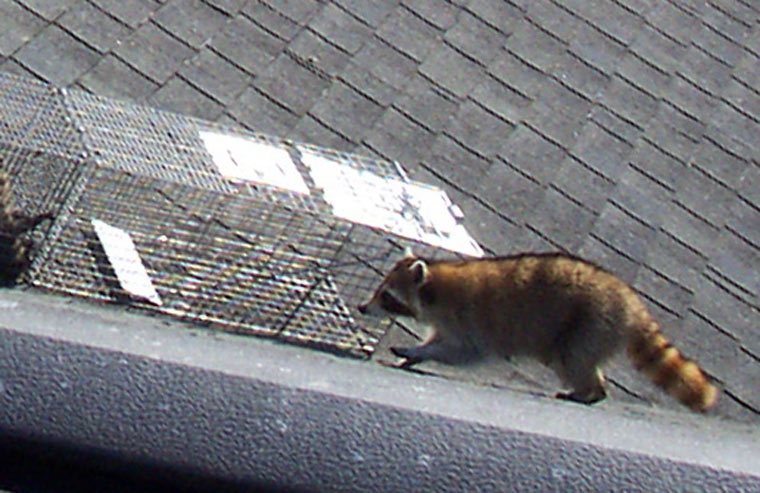- info@wildlife-removal.com
Call us for help in your town
Wildlife Removal Education
Raccoon on the Roof - What to do next
Need raccoon removal in your hometown? We service over 500 USA locations! Click here to hire us in your town and check prices - updated for year 2020.
Finding a raccoon on the roof should be a very big warning — that raccoon is probably living in your attic right now. If it isn't, it soon will be. Raccoons like to hang out in attics, not just because it's high and they like the view, although, that might very well be the case too, but also because it reminds them of life in the trees. The attic and all its little nooks and crannies is just like a tall tree with lots of hollows in it.

Also read about:
How to get raccoons out of the attic
How to remove raccoons from a house
How to remove raccoons from a chimney
How to Remove Animals from Barrel Tile Roofs
That raccoon is hanging out on your roof because your roof is technically the animal's balcony.
A raccoon on the roof is usually a very good sign that you have a raccoon living in your attic, or a raccoon is trying to break into your attic with the intention of living in there.
Female raccoons usually give birth to their young in the mid to late parts of spring and into the summer. If you have spotted a raccoon on the rood during spring and summer, there is a really high chance that you have a female in there with a nest of kits — young raccoons.
What does this mean for you? Well, a lot of hard work; that's what. Getting rid of an animal that has babies in a nest is a very different story to getting rid of a lone pest animal on its own.
First things first …
You will need to either hire someone to do the job for you, or head up onto the roof to have a good look at what's going on up there. Where is the access point? Is there even an access point yet, or did you somehow (and miraculously) come across a problem in the process of kicking off? Any patch of damage must be noted down — every hole, every crack, every crevice; all of it.
And then comes …
Once you know where those patches of damage and holes are, you can seal them up. There are a couple of times when you can't do this:
1 - When there are babies in a nest. You will lock the mother out, the kits in, and the latter will likely starve to death. (Those bodies will kick up a right stink in a few weeks time too!)
2 - When you can't be sure the raccoon is out. If you're not sure, you might just be sealing the animal in. It will get out eventually, and it'll wreak havoc and destruction as it does so. Plus, having a raccoon in your home is a recipe for disaster as far as diseases are concerned.
And then you do this …
You have a few options here. You can use repellents and deterrents to try and drive the raccoon away up on your roof and in your attic, but these rarely work and usually end up being a waste of effort, time, money, and your expectations.
Trapping raccoons only works in certain circumstances, and usually when other efforts, such as exclusion devices, have failed. We urge you to check the laws where you live before taking out any action regarding trapping, kill-trapping, shooting, poisoning, drowning, or any other form of raccoon capture, transportation, or death. Read more about how to keep raccoons away.
You can use young raccoons to try and lure a mother into the trap, if you know where the mothers are. You cannot trap the mother without her young, otherwise, you might find them. (And, again, they'll die in your home somewhere and it'll take you a lifetime to find them, the smell getting worse all the while.)
Exclusion devices are a great idea, but, again, only work with solo raccoons and NOT with females that have kits in a nest/den.
And that all leaves you with one simple, straightforward solution — hiring in a wildlife rehabilitator. Although expensive in worst-case scenarios, hiring in a professional is usually a fraction of the price of trying to get rid of raccoons on the roof or in the attic on your own. It's also a lot easier too. These are dedicated experts with years of experience behind them, all the appropriate licenses and insurances, and a personal knowledge of these animals that the majority of homeowners or business owners just won't have.
Go back to the Raccoon Removal page, or learn tips to do it yourself with my How to Get Rid of Raccoons guide.


















